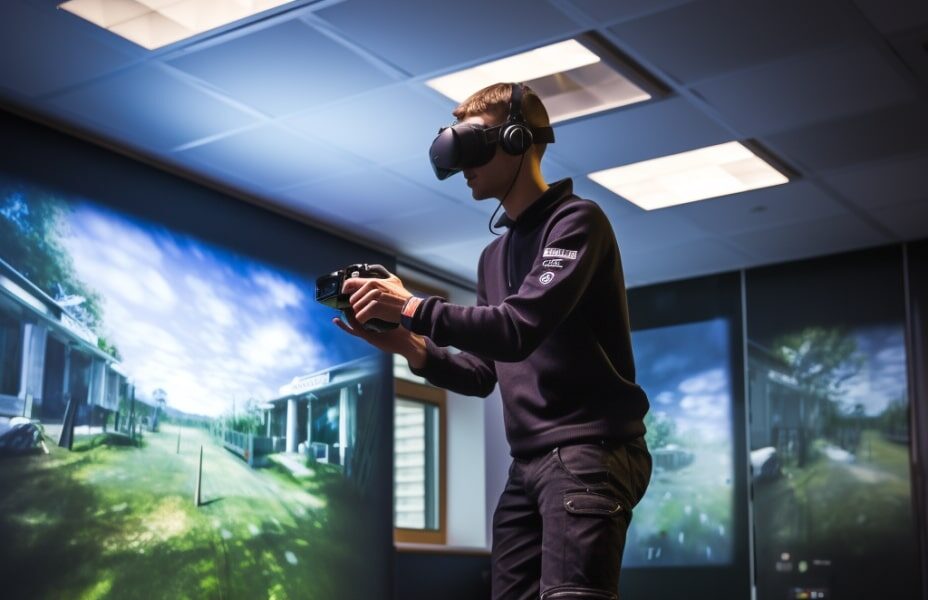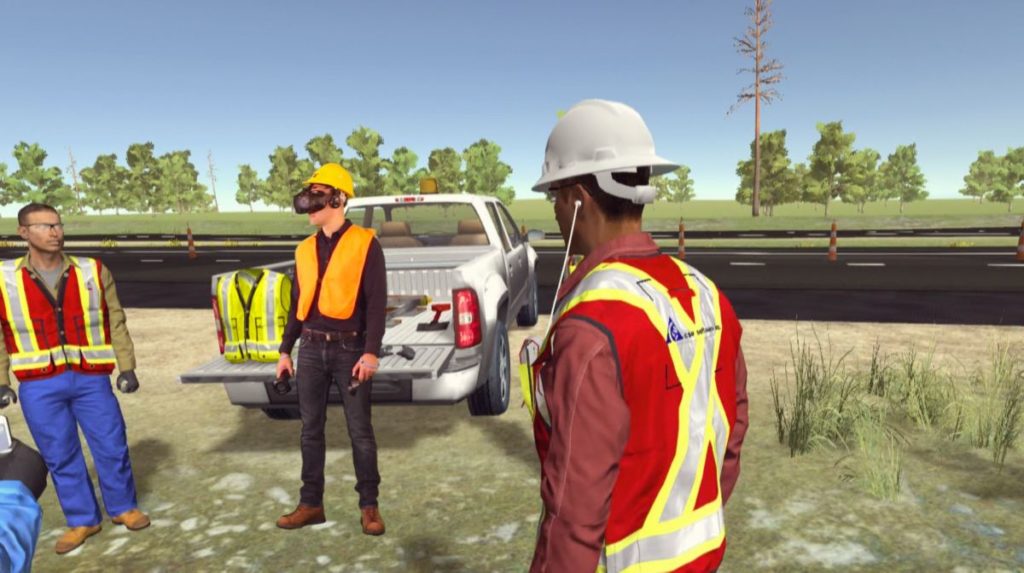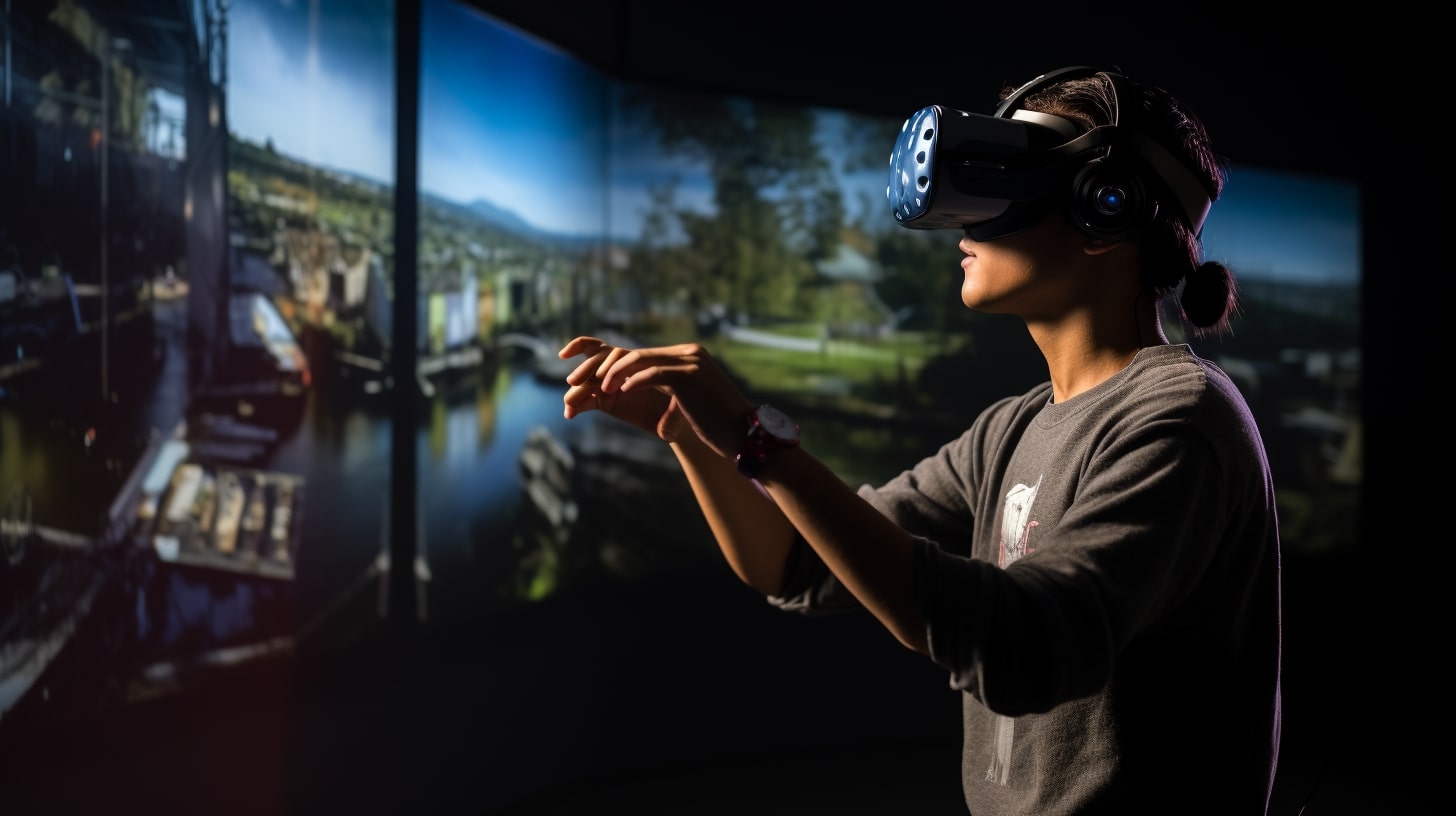Becoming successful in your career takes more than just hard skills. Although hard skills are associated with particular technical expertise, soft skills are character attributes that help foster relationships and resolve issues in the workplace. Additionally, soft skills enable you to make the most of your hard skills. And, these soft skills can be enhanced with the help of Virtual Reality Company like Twin Reality.
According to research conducted by the European Journal of Training and Development, companies implementing soft skill training show over 14% improvement in employee performance and a 12% increase in productivity.


A survey conducted by LinkedIn Learning found that 92% of talent development professionals believe that soft skills are equally or more important than hard skills.
State of VR in Training

- Virtual Reality (VR) training offers numerous advantages over traditional training methods:
- Studies have shown that VR training leads to better knowledge retention compared to traditional methods.
- VR provides an immersive and interactive environment that engages multiple senses, enhancing the learning experience.
- VR can recreate complex and realistic scenarios, allowing learners to practice in situations that closely resemble their actual work environment.
- VR training can be tailored to individual needs, offering a personalized learning experience.
- The immersive nature of VR training captures learners’ attention and promotes higher levels of engagement.
VR's Impact on Soft Skills Development
Virtual Reality (VR) facilitates immersive learning experiences for soft skills through its unique ability to create realistic, interactive, and emotionally engaging scenarios:
Realistic
VR can replicate real-world scenarios with a high degree of fidelity, whether it’s a team meeting, customer interaction, or conflict resolution. Learners are placed in a 3D environment that closely mimics their workplace, allowing them to navigate situations as they would in their jobs. This realism enhances the relevance of the training.
Interactive
VR environments are interactive, meaning that learners can actively participate in the training scenarios. They can engage in conversations, make decisions, and perform actions as they would in a real-life situation. This hands-on experience fosters a deeper understanding of how soft skills are applied in practice.
Emotionally Engaging
VR can elicit emotional responses, which are vital for soft skills development, especially in areas like empathy, conflict resolution, and leadership. Learners can connect with virtual characters or situations on an emotional level, making the learning experience more impactful.
Virtual Reality (VR) offers a versatile platform for enhancing a wide range of soft skills, including:
- Communication Skills: VR simulations allow individuals to practice effective verbal and non-verbal communication, active listening, and adaptability in various scenarios, from job interviews to customer interactions.
- According to a survey conducted by the National Association of Colleges and Employers (NACE), communication skills consistently top the list of attributes employers seek in new hires.
- Leadership Skills: VR can immerse learners in leadership scenarios, where they can practice decision-making, delegation, conflict resolution, and team management, improving their leadership capabilities.
In a survey by LinkedIn Learning, leadership and management were identified as the most in-demand soft skills.
- Leadership Skills: VR can immerse learners in leadership scenarios, where they can practice decision-making, delegation, conflict resolution, and team management, improving their leadership capabilities.
- Teamwork and Collaboration: VR team-building exercises enable participants to work together in a virtual environment, fostering skills such as cooperation, conflict resolution, and collective problem-solving.
- Emotional Intelligence: VR can evoke emotional responses and empathy in learners, helping them better understand and manage their own emotions while also enhancing their ability to relate to others.
Numerous studies, including research published in the Harvard Business Review, emphasize the importance of emotional intelligence in the workplace.
- Emotional Intelligence: VR can evoke emotional responses and empathy in learners, helping them better understand and manage their own emotions while also enhancing their ability to relate to others.
- Presentation and Public Speaking: VR offers opportunities to practice delivering presentations to virtual audiences, improving public speaking, confidence, and effective presentation skills.
Designing VR Training for Soft Skills
Effective Virtual Reality (VR) soft skills training programs incorporate several key components to maximize their impact and facilitate skill development. The following components must be considered while designing a VR industrial training program:
- Realistic Scenarios: VR training should immerse participants in lifelike scenarios relevant to the soft skills being developed. These scenarios should closely resemble real-world situations, enabling learners to practice in a context that mirrors their daily work environment.
- Interactivity: VR offers an interactive learning experience where participants can make decisions, engage with virtual characters, and actively apply their soft skills. Interactivity fosters engagement and skill practice.
- Feedback Mechanisms: VR programs should provide immediate and constructive feedback to learners. This feedback can be automated or facilitated by instructors, helping participants understand their strengths and areas for improvement.
- Customization: Effective VR training is often customizable to individual needs and skill levels. Learners can progress at their own pace and focus on specific areas of soft skill development.
- Emotional Engagement: VR can evoke emotional responses, which is essential for soft skills like empathy and emotional intelligence. Effective VR programs are designed to engage learners emotionally, allowing them to connect with virtual characters or scenarios.
- Integration with Traditional Training: Some organizations integrate VR training with existing training methods to create a blended approach. This combination allows learners to benefit from both the immersive qualities of VR and the strengths of traditional training.
- Content Diversity: VR training should offer a variety of scenarios and soft skill challenges to ensure that learners experience a broad range of situations and interactions.
- Assessment and Progress Tracking: VR programs should include methods for assessing learner progress and skill development, such as quizzes, simulations, and performance evaluations.
Case Studies of Successful VR Training Implementations
Several organizations have successfully implemented Virtual Reality (VR) training programs to enhance soft skills. Here are a few case studies illustrating successful VR training implementations for soft skills development:
Walmart’s VR Training Program
Walmart has implemented VR training across its stores for employees. The VR program covers scenarios like dealing with holiday rushes and Black Friday events. It provides a realistic and immersive experience, helping employees enhance their customer service skills, including soft skills such as communication and problem-solving.
PwC’s “Virtual Reality Leadership” Program
PricewaterhouseCoopers (PwC) developed a VR training program called “Virtual Reality Leadership” to enhance leadership and communication skills. The program immerses participants in realistic business scenarios, allowing them to practice decision-making, teamwork, and communication in a virtual boardroom setting. PwC reported positive feedback and increased confidence in leadership skills among participants.
KPMG’s “KPMG Ready” VR Training
KPMG developed a VR training program called “KPMG Ready” to prepare its employees for various client interactions. The program includes simulations of client meetings and presentations, helping employees enhance their communication, interpersonal, and client relationship skills. KPMG reported improved confidence and performance among participants.
Deloitte’s VR Leadership Development
Deloitte has implemented VR training for leadership development. The program includes immersive simulations of leadership scenarios, allowing participants to practice decision-making, communication, and team management. Deloitte reported positive outcomes, with participants expressing increased confidence in their leadership capabilities.
Emirates’ VR Cabin Crew Training
Emirates Airlines has integrated VR into its cabin crew training program to enhance soft skills such as customer service, communication, and teamwork. The VR simulations allow trainees to practice responding to various in-flight scenarios and interacting with passengers, contributing to improved customer service skills.
Predictions for the Future of VR in Soft Skills Training
- VR will play a substantial role in employee onboarding, transforming the traditional 2D process into an immersive, scenario-based experience.
- VR training will extend beyond large enterprises, becoming more prevalent in education, from primary schools to vocational training, and training agencies responding to the demand for immersive learning experiences.
- More companies will transition from pilot programs to full VR implementations in their learning programs.
- Acceleration driven by the integration of VR training with Learning Management Systems (LMS) and Learning Experience Platforms (LXP), offering an effective way to apply e-learning knowledge to real-life situations.
- Instructional designers will emerge as the new creators of VR training content, moving beyond traditional programming roles.
Challenges and Potential Solutions in VR Training
| Challenges in VR Training | Potential Solutions |
| Scalability | |
|
|
|
|
|
|
| Accessibility | |
|
|
|
|
|
|
| |
Final Thoughts
Virtual Reality (VR) plays a pivotal role in revolutionizing soft skills training by providing immersive and realistic learning experiences. It transforms traditional training approaches into dynamic, scenario-based simulations that enable participants to practice and refine crucial skills such as communication, teamwork, and leadership in a safe and controlled environment. Overall, VR’s impact on soft skills training lies in its capacity to create engaging, memorable, and effective learning experiences that significantly contribute to professional growth and success.

